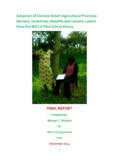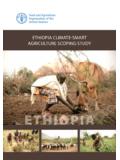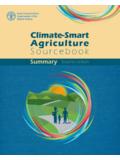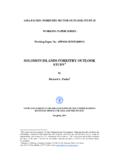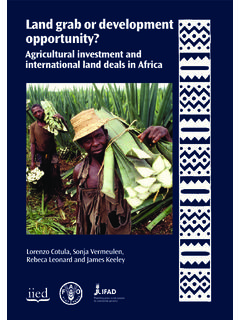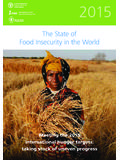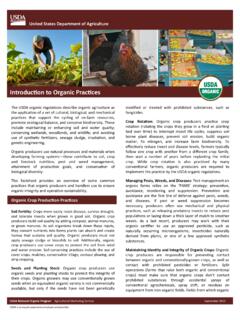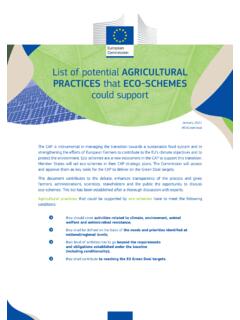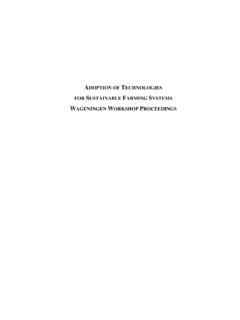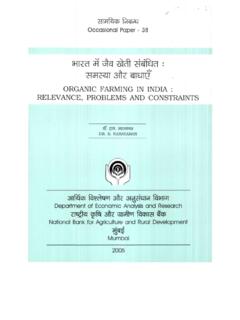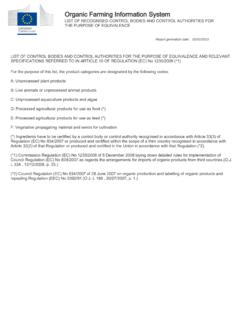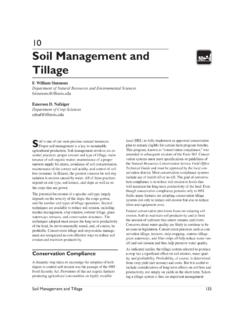Transcription of The importance of soil organic matter
1 The importance ofsoil organic matter Key to drought-resistant soil and sustained food production9789251053669TC/M/A0100E/1 92-5-105366-9 ISSN 0253-2050 soil organic matter the product of on-site biological decomposition affects the chemical and physical properties of the soil and its overall health. Its composition and breakdown rate affect: the soil structure and porosity; the water infiltration rate and moisture holding capacity of soils; the diversity and biological activity of soil organisms; and plant nutrient availability. This Soils Bulletin concentrates on the organic matter dynamics of cropping soils and discusses the circumstances that deplete organic matter and their negative outcomes.
2 It then moves on to more proactive solutions. It reviews a basket of practices in order to show how they can increase organic matter content and discusses the land and cropping benefits that then importance ofsoil organic matterKey to drought-resistant soiland sustained food productionThe importance ofsoil organic matterKey to drought-resistant soiland sustained food productionFAOSOILSBULLETINFAO SOILS BULLETIN8080 FAOThe importance of soil organic matter Key to drought-resistant soil and sustained food production80 ISSN 0253-2050 Copies of FAO publications can be requested from:SALES AND MARKETING GROUPI nformation DivisionFood and Agriculture Organization of the United NationsViale delle Terme di Caracalla00100 Rome, ItalyE-mail: (+39) 06 57053360 Web site: photographs:Background: Honduras.
3 FAO/18884/G. : Honduras. FAO/18907/G. importance of soil organic matterKey to drought-resistant soil and sustained food and productionbyAlexandra BotFAO Consultant andJos BenitesFAO Land and Plant Nutrition Management ServiceFOOD AND AGRICULTURE ORGANIZATION OF THE UNITED NATIONSRome, 2005 FAOSOILSBULLETIN80 The designations employed and the presentation of material in this information product do not imply the expression of any opinion whatsoever on the part of the Food and Agriculture Organization of the United Nations concerning the legal or development status of any country, territory, city or area or of its authorities, or concerning the delimitation of its frontiers or 92-5-105366-9 All rights reserved.
4 Reproduction and dissemination of material in this information product for educational or other non-commercial purposes are authorized without any prior written permission from the copyright holders provided the source is fullyacknowledged. Reproduction of material in this information product for resale or other commercial purposes is prohibited without written permission of the copyright holders. Applications for such permission should be addressed to: Chief Publishing Management ServiceInformation Division FAO Viale delle Terme di Caracalla, 00100 Rome, Italy or by e-mail to: FAO 2005iiiContentsAcknowledgements viiiPreface ixList of acronyms xi1.
5 Introduction 12. organic matter decomposition and the soil food web 5 soil organic matter 5 The soil food web 5 Decomposition process 7 Non-humic substances: significance and function 8 Compounds and function of humus 83. Natural factors influencing the amount of organic matter 11 Temperature 11 soil moisture and water saturation 12 soil texture 12 Topography 13 Salinity and acidity
6 13 Vegetation and biomass production 134. Practices that influence the amount of organic matter 15 Human interventions that influence soil organic matter 15 Practices that decrease soil organic matter 15 Decrease in biomass production 15 Replacement of perennial vegetation 15 Replacement of mixed vegetation with monoculture of crops and pastures 16
7 High harvest index 16 Use of bare fallow 17 Decrease in organic matter supply 17 Burning of natural vegetation and crop residues 17 Overgrazing 17 Removal of crop residues 17 Increased decomposition rates 18 Tillage practices 18 Drainage 19 Fertilizer and pesticide use 19 Practices that increase soil organic matter 19 Increased biomass production
8 20 Increased water availability for plants: water harvesting and irrigation 20 Balanced fertilization 21 Cover crops 21 Improved vegetative stands 22ivAgroforestry and alley cropping 23 Reforestation and afforestation 26 Regeneration of natural vegetation
9 27 Increased organic matter supply 27 Protection from fire 27 Crop residue management 27 Utilizing forage by grazing rather than by harvesting 28 Integrated pest management 28 Applying animal manure or other carbon-rich wastes 28 Compost 29 Mulch or permanent soil cover 29 Decreased decomposition rates 30 Reduced or zero tillage 305.
10 Creating drought-resistant soil 35 Effect of soil organic matter on soil properties 35 Inefficient use of rainwater 35 Increased soil moisture 35 Reduced soil erosion and improved water quality 386. Key factors in sustained food production 41 Increased plant productivity 41 Increased fertilizer efficiency 41 Reduced waterlogging 42 Increased yields 42 Reduced herbicide and pesticide use 44 Increased biodiversity


